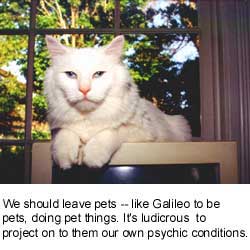


Who needs (pet) therapy?
The popularity of psychological treatment for pets suggests our society is increasingly sentimental and detached from reality.
November 17, 1998
|
|

First, let me state that I am not a pet fancier; I don't collect animals as pretty objects. And I am not a pet owner; the animals in my household own me. Three cats jointly rule my home. Mr. Pilgrim is a true alley cat. He ate at the backs of some of the best restaurants in Toronto before joining the family and moving with us to B.C. to adopt a more laid-back lifestyle. Mr. Galileo is a native Victorian with more personality than either brains or coordination. He moved in shortly after we arrived. And Enchante, the Lady of the House, is an enchanting blue-eyed feline with a long white fur coat. Her meow directs all activities. I admit it -- I anthropomorphize my cats. I attribute to each a greater or lesser degree of intelligence. I view each as having a distinct personality. I adjust to their moods; Enchante's need to hide under the bed when she is sad; Galileo's anger with the vet because of a traumatic first visit; and Pilgrim's compulsion to go in and out the screen door. I love my "family." I miss them when I travel. The thought that I will likely survive to see them age and die can reduce me to tears. My love affair with animals goes back a long way. I grew up with stories of Lassie and National Black Velvet. I spent my Saturday mornings with Rin Tin Tin. Dr. Doolittle is one of my favorite movies. And I have often said that my goal in life is to become an eccentric old lady with a house full of cats. All in all, pets are near and dear to me, deserving of the very best in food, accommodation and health care I can provide. They will get their rabies shots, catnip treats and even a brass bed by the fireplace. But there's no way I'll descend to providing psychotherapy for them. That's where I draw the line. I say this because therapy for pets is now a booming business. (No one should be surprised by this, particularly in a culture where it is assumed that "a little bit of therapy" is good for everyone.) I'm not talking about the obedience trainers who teach puppies to sit or stay. I'm referring to those who presume to help pets with their supposed emotional problems. Many of these so-called therapists operate in ways similar to those who provide alternative medicine for a variety of human conditions. Animal psychologist-behaviourist-communicator Warren Eckstein, in Santa Monica, California, is one of the most renowned animal therapists. He claims to enjoy a telepathic contact with animals that allows him to "talk" with them by reading their "parapsychology and body language." He gets down on all fours to commune with his patients, ladling on the hugs and kisses, treating the creatures with the respect, dignity and the love you're supposed to give to more human family members. British pet therapist Sonya Fitzpatrick quietly chats with her clients. In one case, she describes how a dying dog told her how he wanted to spend his last days and complained that his owners had never bought him a new collar. Sonya was able to tell the owners: "He wants you to know he loves you and he doesn't fear dying." Carol Gurney, who describes herself as an "Interspecies Communicator and Bodywork Therapist for Animals," practices telepathic communication to resolve emotional problems in animals and, of course, to help rescued animals that have been victims of abuse or neglect. But pet therapy is not restricted to these alternative methods. Veterinarian Nicholas Dodman, the author of two self-help pet books, The Cat Who Cried for Help and The Dog Who Loved Too Much, says that cats can suffer from psychiatric disorders such as obsessive-compulsive disorders or schizophrenic behaviours. Symptoms such as chewing or sucking woolen products or going to the bathroom in the wrong place may indicate the need for the kitty shrink. And if pussy chases an object that doesn't exist (a sign of hallucinations), plays with old socks (a sexual obsession) or overeats (another compulsive disorder), Dodman prescribes a kitty dose of Prozac. The popularity of these services is, it seems, good business. Fitzpatrick says she's made a fortune analysing pets after moving to the U.S. from Britain. Some of us, however, are trying to resist making this branch of the psychotherapy industry even more wealthy, particularly when the notion of humans analysing animal mentality is about as intelligible as tea-leaf reading and Ouija board communications with the dead. Given this, though, you have to wonder why presumably intelligent people are willing to send their animals to pet shrinks. A Lassie cartoon a friend of mine has over his desk illustrates the absurdity of the idea. The first panel shows Timmy sinking into a pool of quicksand as he yells to his dog: "Lassie, get help!" The second panel shows Lassie lying on the couch as the analyst asks: "Tell me how you felt about Timmy." People and animals have lived together for millennia. But only recently have domesticated animals achieved the pampered status of children in families. (Interestingly, the Oxford English Dictionary notes that another meaning of the word pet is that of "spoiled child.") It would seem that for some people, pets have become their ideal children; they never grow up and they never cease to be objects of love. Nevertheless, to project human psychological conditions on to animals is a mark of a society that continues to descend in to a sentimental view of the world, including the animal world. Certainly, the value of pets to those of us who love them is beyond question. But why subject them to our crazy ways? "Get off the couch" is about all that the dogs, cats, guinea pigs and pet iguanas of the 1990's need to hear from us. For
interest see article in THE INDIANAPOLIS NEWS
|
tanadineen.com
@ Dr.Tana
Dineen
1998-2003
by
Dr. Tana Dineen, special columnist,
The Ottawa Citizen